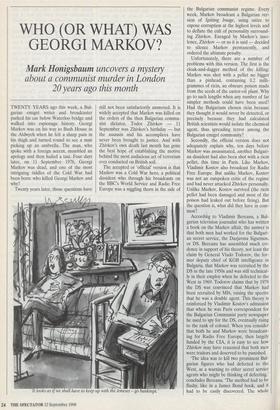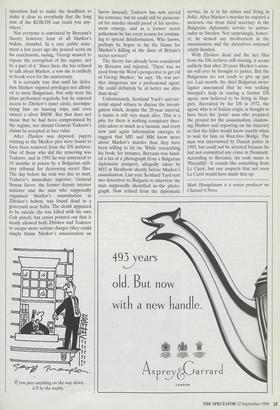WHO (OR WHAT) WAS GEORGI MARKOV?
about a communist murder in London 20 years ago this month
TWENTY YEARS ago this week, a Bul- garian emigre writer and broadcaster parked his car below Waterloo bridge and walked into espionage history. Georgi Markov was on his way to Bush House in the Aldwych when he felt a sharp pain in his thigh and turned round to see a man picking up an umbrella. The man, who spoke with a foreign accent, mumbled an apology and then hailed a taxi. Four days later, on 11 September 1978, Georgi Markov was dead, and one of the most intriguing riddles of the Cold War had been born: who killed Georgi Markov and why?
Twenty years later, those questions have still not been satisfactorily answered. It is widely accepted that Markov was killed on the orders of the then Bulgarian commu- nist dictator, Todor Zhivkov — 11 September was Zhivkov's birthday — but the assassin and his accomplices have never been brought to justice. And with Zhivkov's own death last month has gone the best hope of establishing the motive behind the most audacious act of terrorism ever conducted on British soil.
The accepted or 'official' version is that Markov was a Cold War hero, a political dissident who through his broadcasts on the BBC's World Service and Radio Free Europe was a niggling thorn in the side of
t oo as t we s a have to eep up with the Joneses - go
the Bulgarian communist regime. Every week, Markov broadcast a Bulgarian ver- sion of Spitting Image, using satire to expose corruption at the highest levels and to deflate the cult of personality surround- ing Zhivkov. Enraged by Markov's inso- lence, Zhivkov — or so it is said — decided to silence Markov permanently, and ordered the ultimate penalty.
Unfortunately, there are a number of problems with this version. The first is the cloak-and-dagger method of the killing: Markov was shot with a pellet no bigger than a pinhead, containing 0.2 milli- grammes of ricin, an obscure poison made from the seeds of the castor-oil plant. Why go to such lengths when any number of far simpler methods could have been used? Had the Bulgarians chosen ricin because they thought it would never be detected, or precisely because they had calculated British scientists would isolate the chemical agent, thus spreading terror among the Bulgarian emigre community?
Secondly, the official version does not adequately explain why, ten days before Markov was assassinated, another Bulgari- an dissident had also been shot with a ricin pellet, this time in Paris. Like Markov, Vladimir Kostov also broadcast for Radio Free Europe. But unlike Markov, Kostov was not an outspoken critic of the regime and had never attacked Zhivkov personally. Unlike Markov, Kostov survived (the ricin pellet had been damaged and most of the poison had leaked out before firing). But the question is, what did they have in com- mon?
According to Vladimir Bereanu, a Bul- garian television journalist who has written a book on the Markov affair, the answer is that both men had worked for the Bulgari- an secret service, the Dazjavma Sigunnos, or DS. Bereanu has assembled much evi- dence in support of his theory, not least the claim by General Vlado Todorov, the for- mer deputy chief of KGB intelligence in Bulgaria, that Markov was recruited by the DS in the late 1950s and was still technical- ly in their employ when he defected to the West in 1969. Todorov claims that by 1978 the DS was convinced that Markov had been recruited by MI6, raising the spectre that he was a double agent. This theory is reinforced by Vladimir Kostov's admission that when he was Paris correspondent for the Bulgarian Communist party newspaper he used to spy for the DS, eventually rising to the rank of colonel. When you consider that both he and Markov were broadcast- ing for Radio Free Europe, then largely funded by the CIA, it is easy to see how Zhivkov may have reasoned that both men were traitors and deserved to be punished.
'The idea was to kill two prominent Bul- garian figures who had defected to the West, as a warning to other secret service agents who might be thinking of defecting,' concludes Bereanu. 'The method had to be flashy, like in a James Bond book, and it had to be easily discovered. The whole operation had to make the headlines to make it clear to everybody that the long arm of the KGB-DS can reach you any- where.'
Not everyone is convinced by Bereanu's theory, however, least of all Markov's widow, Annabel. In a rare public state- ment a few years ago she poured scorn on his conclusions, saying, `Georgi wanted to expose the corruption of the regime, not be a part of it.' Since then, she has refused to talk about Markov, a vow she is unlikely to break even for the anniversary.
It is certainly true that until his defec- tion Markov enjoyed privileges not afford- ed to most Bulgarians. Not only were his plays performed regularly, but he enjoyed access to Zhivkov's inner circle, accompa- nying him on hunting trips, and even owned a silver BMW. But that does not mean that he had been compromised by the regime, nor should General Todorov's claims be accepted at face value.
After Zhivkov was deposed, papers relating to the Markov plot were found to have been removed from the DS archives. One of those who did the removing was Todorov, and in 1992 he was sentenced to 14 months in prison by a Bulgarian mili- tary tribunal for destroying secret files. The day before his trial was due to start, Todorov's immediate superior, General Stoyan Savoy, the former deputy interior minister and the man who supposedly organised Markov's assassination at Zhivkov's behest, was found dead in a graveyard near Sofia. The death appeared to be suicide (he was killed with his own Colt pistol), but cynics pointed out that it neatly allowed both Zhivkov and Todorov to escape more serious charges (they could simply blame Markov's assassination on `If you pass anything on the way down, it'll be the rouble.' Savoy instead). Todorov has now served his sentence, but he could still be prosecut- ed for murder should proof of his involve- ment emerge, and as a former secret policeman he has every reason for continu- ing to spread disinformation. Who knows, perhaps he hopes to lay the blame for Markov's killing at the door of Britain's secret services?
The theory has already been considered by Bereanu and rejected. 'There was no need from the West's perspective to get rid of Georgi Markov,' he says. 'He was nei- ther dangerous nor a professional agent. He could definitely be of better use alive than dead.'
Unfortunately, Scotland Yard's anti-ter- rorist squad refuses to discuss the investi- gation which, despite the 20-year interval, it insists is still very much alive. This is a pity, for there is nothing conspiracy theo- rists adore so much as a vacuum, and every now and again information emerges to suggest that MI5 and MI6 know more about Markov's murder than they have been willing to let on. While researching his book, for instance, Bereanu was hand- ed a fax of a photograph from a Bulgarian diplomatic passport, allegedly taken by M15 at Heathrow shortly before Markov's assassination. Last year Scotland Yard sent two detectives to Bulgaria to interview the man supposedly identified in.- the photo- graph. Now retired from the diplomatic service, he is in his sixties and living in Sofia. After Markov's murder he enjoyed a meteoric rise from third secretary in the Bulgarian diplomatic service to ambas- sador to Sweden. Not surprisingly, howev- er, he denied any involvement in the assassination and the detectives returned empty-handed.
With Zhivkov dead and the key files from the DS archives still missing, it seems unlikely that after 20 years Markov's assas- sin will ever be brought to justice. But the Bulgarians are not ready to give up just yet. Last month, the chief Bulgarian inves- tigator announced that he was seeking Interpol's help in tracing a former DS agent, now believed to be living in Hun- gary. Recruited by the DS in 1972, the agent, who is of Italian origin, is thought to have been the 'point' man who prepared the ground for the assassination, shadow- ing Markov and reporting on his itinerary so that the killer would know exactly when to wait for him on Waterloo Bridge. The man was interviewed by Danish police in 1993, but could not be arrested because he had not committed any crime in Denmark. According to Bereanu, his code name is 'Piccadilly'. It sounds like something from Le Carre, but one suspects that not even Le Carr e would have made that up.
Mark Honigsbaum is a senior producer on Channel 4 News.



































































 Previous page
Previous page